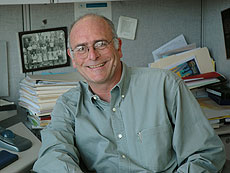January 15, 2007
New Teacher Center supports new principals, too
By
Jennifer McNulty
Good teachers make all the difference for children in the classroom, and good principals bring out the best in their teachers.

Gary Bloom
Photo: Jennifer McNulty |
That's why the UCSC New Teacher Center provides support and coaching not only to novice teachers but to new principals, too.
"Research shows that quality teachers make the biggest difference in student achievement, but who identifies, recruits, and hires those teachers? Who makes sure the working conditions allow teachers to succeed? Who holds the school's vision for success, builds a learning community, sets the tone for student discipline, and oversees operations? It's the principal," said Gary Bloom, associate director of the New Teacher Center (NTC). "A quality principal is going to nurture and retain effective teachers."
Effective leadership at the school and district level is critical to teacher satisfaction and success, said Bloom.
"If you ask former teachers why they left the profession, it's typically not about salary," said Bloom. "It's working conditions, and support and leadership at the school site."
Bloom likens the principal's role to that of a hospital administrator. "You can have the best surgeons on staff, but if you don't have a well-administered hospital with good nurses, sterile equipment, and proper oversights, you can have the best doctors in the world and not get the results you want."
Until recently, new principals were plunged into a "sink or swim" environment, but that is changing as NTC collaborates with a growing number of school districts to provide one-on-one coaching to new administrators. The center's on-the-job training is modeled after its highly regarded mentoring program, which helps new teachers during their first two years in the classroom. About 70 people in the Central Coast region are participating in the new-administrator program this year, and the center recently joined forces with the Association of California School Administrators (ACSA) to provide support statewide, said Bloom.
The retirement of the baby boomer generation is putting additional pressure on school districts, said George Manthey, assistant executive director of ACSA. "There are so many young administrators today who don't have the amount of experience I had when I became a principal," said Manthey, who taught for 15 years before moving into administration. "And they're being placed in schools with difficult problems, so it's even more important for them to have access to a coach."
The NTC has trained more than 3,000 coaches who are supporting thousands of principals and other school leaders in California and around the country. Manthey said the NTC was "the obvious choice" for ACSA because the association wanted to work with highly trained coaches.
"In California, we invest $6,000 a year in every new teacher's first two years in the classroom," noted Bloom, (B.A. sociology and a teaching credential; 1975). "We don't spend a nickel on new principals."
Principals and administrators in California are required to have a minimum of three years teaching experience as well as a credential issued by an institution of higher education, but theory only goes so far, said Bloom, a former teacher who left his post as superintendent of the Aromas-San Juan Unified School District to help found the NTC 10 years ago.
Technical aspects of the job can be taught, including budgeting, management, and how to run a meeting, analyze student achievement data, and negotiate labor contracts. "That's the easy part--anybody can learn that," said Bloom, who became an assistant principal at the age of 26.
What's tough are interpersonal situations, from employee and student discipline to angry parents and local politics, and the challenges of directing changes to improve student achievement. "It's a complex job with a great deal of ambiguity," said Bloom. "There are a lot of problems that come up that aren't addressed during pre-service programs. It's much easier for a coach to provide support in real time."
The NTC's two-year program includes one-on-one meetings between principals and certified coaches every other week, plus monthly half-day institutes that bring together regional principals and coaches. The center charges districts $4,000/year per administrator.
"Seventy-five percent of participants say their coach influenced their decision to stay in the job," said Bloom, coauthor of Blended Coaching: Skills and Strategies to Support Principal Development, a book that presents the research behind the NTC's success and makes its strategies available to school districts nationwide.
"The biggest asset a coach or mentor brings to a situation is a new perspective," said Bloom. "Think about Tiger Woods, the greatest golfer in the world. After each tournament, he walks the course with his coach to analyze his performance. Now, his coach doesn't play golf as well as he does--nobody does--but Tiger Woods still benefits from going over his work with his coach."
In addition to its work in California, the NTC is working with the states of Washington, Alaska, Illinois, and Iowa to design and implement principal-support programs, noted Bloom.
Such programs are likely to be in high demand as the baby-boomer generation of principals and administrators begins to retire. "We already have a shortage of candidates," said Bloom.
Principals work extraordinarily long hours, encounter high expectations, and face greater accountability in an era of tight budgets, he added. "I've had teachers tell me they've looked at the time commitment and have calculated it would be a $10-per-hour pay cut," he noted wryly. Attracting a new generation of leaders will require changes in professional development and support, and changes in culture, as well.
"When you go into the classroom as a new teacher, everyone is encouraging and supportive," said Bloom. "But when you take over as the new principal, there are people who are just watching and waiting for you to stumble and fall."
As people understand the impact school leadership has on student performance, that will change, predicted Bloom. "We're cynical about leadership in this country," he said. "But I think that's changing."